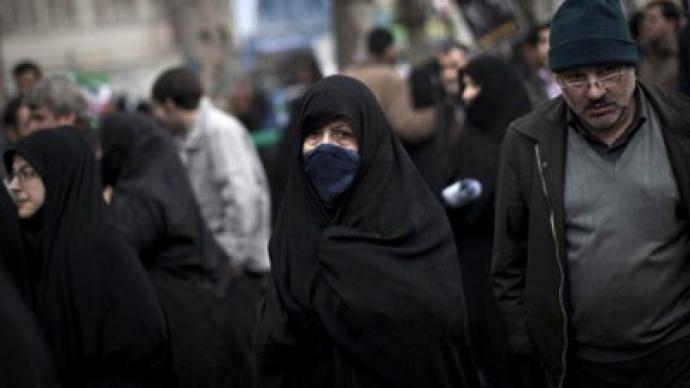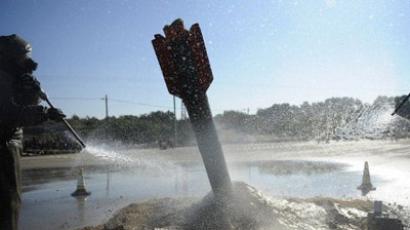Iranians skeptical about Israeli attack threat

Israel’s possible military operation against Iran is a hot topic in today’s global politics. But when Iranians themselves talk about it, you could think they are speculating about a remote possibility, claiming their country is too tough for Israel.
By and large, few people in Iran actually regard a possible invasion by Israel as an imminent threat. According to the commonly accepted notion inside the country, Iran is too tough for Israel – after all, it stood its ground in an 8-year-long war against Saddam Hussein’s Iraq, which arguably had the entire world backing it. Most of the world views Iran as an aggressive ‘regime’ bent on obliterating Israel. The Iranians themselves say this is a misperception stemming from Ayatollah Khomeini’s misquoted statement from 30 years back. Originally, the Imam proclaimed an unfair regime such as Israel should not exist on the world map. “The territory where Israel is located, we do not consider it Israel. It is the same as Napoleon occupying Russia, or Hitler occupying France. Likewise, the Israelis simply invaded and occupied Palestine. We believe any territory belongs to the people who live there. And Israel was created by the British as part of their policy for sowing discord among Muslims,” says Iran’s former Foreign Minister Ali Akbar Velayati, International Affairs Advisor to the Supreme Leader. His is a generally accepted outlook on Israel in Iran. Velayati has authored two books on the subject. “We are prepared to defend ourselves against any aggressor. Should Israel be crazy enough to attack Iran, there will hardly be anything left of Israel when it is over,” says Velayati. He goes on to tell me about his recent visit to the Lebanese-Palestinian border. “I was about ten meters away from the nearest Israeli border guard,” he says. “These heights in Southern Lebanon have lots of tunnels dug out specifically for transporting various types of weapons. Back in 2006, some 5,000 to 6,000 Hezbollah fighters managed to defeat a 40,000-strong IDF force. And these days, they are even stronger than they were.” Velayati is sure that in case of aggression from Israel, Iran will not be the only nation to strike in retaliation. “One of the reasons behind the current pressure against Syria is Israel’s intention to destroy Hezbollah’s entrenchments. [Leader of Hezbollah] Hassan Nasrallah has confirmed that in case Israel invades Iran, Hezbollah will launch attacks across the entire territory of Israel. We are located in Israel’s backyard,” Velayati explains. Ali Akbar Velayati has firsthand knowledge of the kind of sentiment prevalent in the Muslim world by virtue of chairing the Islamic Awakening Conference, which has already organized a number of assemblies. These events have drawn thousands of participants from a total of 80 countries involved in the ‘Islamic awakening.’
Ali Akbar Javanfekr, adviser to President Ahmadinejad and head of Iran’s official news agency IRNA, reiterates a narrative taught to every Iranian student from middle school. “Iran held out through eight years of war with Iraq, being confronted by an entire bloc of enemies, who were backing, arming and supplying Saddam fo fight Iran,” he says. “We stood our ground in spite of everything that was thrown at us: Saddam’s petrodollars and military hardware coming from both the West and the USSR, such as Soviet aircraft, French Mirage fighter jets, German-made chemical weapons, night vision devices, etc. The French deployed their “military instructors,” and the US shot down an Iranian passenger jet… You see, we are battle-hardened people, and we know how to fight all by ourselves.” Iran’s presumable adversary of today is far better equipped and more sophisticated than Iraq was back in the 1980s. Nevertheless, Ali Akbar Javanfekr believes his country can provide an efficient response. “Our situation is also dramatically different these days,” he believes. “Iran is a very strong nation today. We have become very powerful both in economic and military terms. We have a highly developed infrastructure. We have endured a different economic period, and today we are pursuing reforms and addressing our challenges. And our enemies are not as consolidated as they used to be – they have a lot of problems at home, and we see their economic situation as troublesome. Besides, there are reasonable people over there, who can avoid a military scenario.” Mr. Javanfekr believes that the United States, and not Israel, is the main threat for Iran. He says the Americans will not risk a military intervention, and instead they tend to exert political pressure against Iran.
“The US wants to intimidate Iran, and in that sense, it still acts like a superpower,” he explains. “But the people of Iran are unimpressed by their grandeur and unabashed by their intimidation efforts. We are calculating and cool-minded in our policies, which rely on reason and logic. Iran has the necessary potential to put up a fight in case things take the most unfavorable turn for us.” Hossein Shariatmadari, president of the Kayhan media group, representative of the Supreme Leader and son of one of Imam Khomeini’s closest supporters, believes the time is on Iran’s side. “All of the global equations are changing,” he explains. “Israel is within reach of our missiles these days, we have our own satellite in outer space, and we play the lead in the entire region – whereas the Americans can no longer do that. When the Occupy movement organized antiwar protests in 80 cities across the US last autumn, opposing an invasion against Iran, you could see American activists carry pictures of the assassinated Iranian scientists.” Hossein Shariatmadari is confident that neither the United States nor Israel will risk a military operation against Iran. “Israel does not have the strength to wage war against Iran. The Americans have had a war plan against Iran on the table for the past ten years, but we have never seen them show any determination to carry it out,” he reasons. Shariatmadari proves his point by citing a number of American and Israeli policy makers. “Prime Minister Netanyahu said three months ago that he is not that stupid to invade Iran. That statement was followed by a storm in the Israeli media and political establishment.” Mr. Shariatmadari says he can still consider a possible military scenario involving an Israeli invasion. “Let us imagine they do decide to attack Iran after all,” he suggests. “What should we expect then? First of all, the entire Israeli territory is exposed to our missiles. And can assure you, Iran will not hesitate one minute before launching a missile strike on Israel. No segment of the Israeli border will be secure.”He recalls that Ayatollah Khamenei addressed President Obama, and said that if Israel attacked Iran, the world would not be secure even for the US itself.“Our young people dream of fighting a war against Israel. Look at the youth in Jordan, Saudi Arabia, Lebanon, Tunisia, and Egypt – do they not want the same?” Shariatmadari also points to a difference in mentality.“By virtue of our mindset, death is just the beginning of life for us, whereas for them, it means the end. In his time, Shimon Peres came to realize this during the First Intifada in the 1980s. During the Thirty-Three Day War of 2006, many people fled from Israel and never returned home, as they did not want to face such jeopardy ever again. Imam Khomeini once said that people who believe in martyrdom can never be enslaved.” Therefore, Shariatmadari believes, if Israel were ever to invade Iran, that would play into the hands of Iran and spell doom for its enemies.
Nadezhda Kevorkova, Tehran














